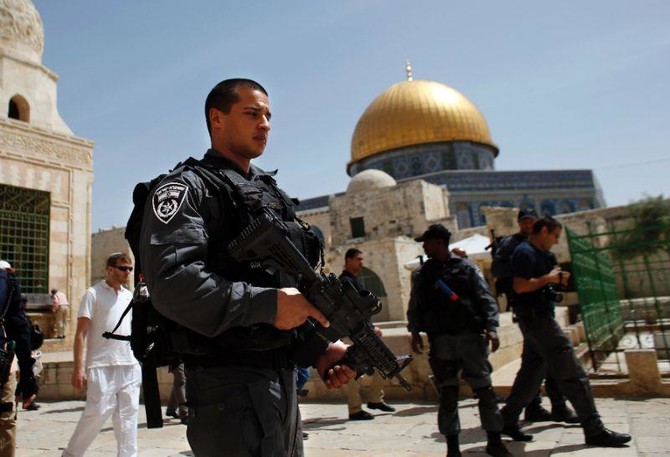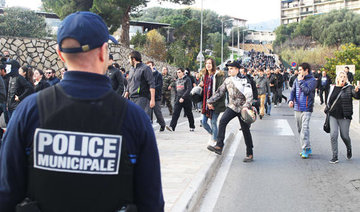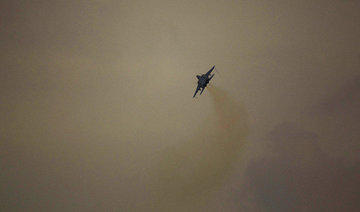JERUSALEM: Six Israelis, including two soldiers, have been arrested for racist attacks against Arabs with knives and other weapons and charged with “terrorist” offenses, authorities said Sunday.
The suspects are accused of having used knives, clubs and bars to carry out at least five separate anti-Arab attacks and acts of vandalism against cars belonging to Arabs, police said in a statement.
Police did not provide details on whether the attacks resulted in serious injuries or how many people were targeted. They were charged in the southern Israeli city of Beersheba.
The accused were allegedly motivated by “nationalist and racist” beliefs, including seeking to prevent Jewish women from having relationships with Arab men.
According to police, they were influenced by a video from the Jewish extreme right group Lehava, which opposes inter-marriage.
In August 2014, Lehava activists staged a rally where racist slogans, including “Death to Arabs!,” were shouted at the wedding near Tel Aviv of a Muslim man and Jewish woman.
The group’s leader, Benzi Gopstein, was questioned by police in 2015 after he condoned torching churches in Israel, in accordance with a mediaeval Jewish commandment to destroy places of idol-worship.
Arabs account for some 17.5 percent of Israel’s eight million population.
Two Israeli soldiers, four others arrested for anti-Arab attacks
Two Israeli soldiers, four others arrested for anti-Arab attacks

Franco-Algerian influencer to stand trial in March
Sofia Benlemmane, a Franco-Algerian woman in her fifties, was arrested on Thursday
LYON: A Franco-Algerian influencer, arrested as part of an investigation into online hate videos, appeared before French prosecutors on Saturday and will stand trial in March, authorities said.
A diplomatic row between France and Algeria has flared up over the arrests of several Algerian social media influencers accused of inciting violence.
Sofia Benlemmane, a Franco-Algerian woman in her fifties, was arrested on Thursday.
Followed on TikTok and Facebook by more than 300,000 people, she is accused of spreading hate messages and threats against Internet users and against opponents of the Algerian authorities, as well as insulting statements about France.
She was ordered to appear before a criminal court on March 18, the public prosecutor’s office said.
She is being prosecuted for a series of offenses including incitement to commit a crime, death threats and “public insult based on origin, ethnicity, nation, race or religion.”
The blogger had insulted a woman during a live broadcast in September, shouting “I hope you get killed, I hope they kill you.”
Her lawyer Frederic Lalliard argued that Benlemmane had committed no criminal offense, even though her comments “may irritate or shock.”
Benlemmane, a former football player, made headlines in 2001 when she was given a seven-month suspended prison sentence for entering the Stade de France pitch outside Paris with an Algerian flag during a France-Algeria friendly match.
Although she was firmly opposed to the government in Algiers in the past, her views have since changed and she now supports the current authorities in Algeria.
Several other Algerian influencers have been the target of legal proceedings in France for hate speech.
Former prime minister Gabriel Attal said that France should cancel a 1968 accord with Algeria that gives Algerians special rights to live and work in France because of the dispute over what he called “preachers of hate.”
Algeria won independence from France in 1962 after a seven-year war.
Health ministry in Hamas-run Gaza says 32 killed in 48 hours

- The ministry said at least 109,571 people have been wounded in more than 15 months of war
- The ministry of health added 499 deaths to its death toll on Saturday
JERUSALEM: The health ministry in Hamas-run Gaza said on Saturday that 32 people were killed in the Palestinian territory over the past 48 hours, taking the overall death toll to 46,537.
The ministry said at least 109,571 people have been wounded in more than 15 months of war between Israel and Hamas, triggered by the Palestinian group’s October 7, 2023 attack.
The ministry of health added 499 deaths to its death toll on Saturday, specifying they have now completed the data and confirmed identities on files whose information was incomplete.
A source in the ministry’s data collection department told AFP that all the 499 additional deaths were from the past several months.
The number of dead in Gaza has become a matter of bitter debate since Israel launched its military campaign against Hamas in response to the Palestinian militant group’s unprecedented attack last year.
Israeli authorities have repeatedly questioned the credibility of the Gaza health ministry’s figures.
But a study published Friday by British medical journal The Lancet estimated that the death toll in Gaza during the first nine months of the Israel-Hamas war was around 40 percent higher than recorded by the health ministry.
The new peer-reviewed study used data from the ministry, an online survey and social media obituaries, but only counted deaths from traumatic injuries. It did not include those from a lack of health care or food, or the thousands of missing believed to be buried under rubble.
The UN considers the Gaza health ministry’s numbers to be reliable.
Lebanon’s new president says to visit Saudi Arabia on first official trip

- Lebanese leader tells crown prince that ‘Saudi Arabia would be the first destination in his visits abroad’
BEIRUT: Lebanon’s newly-elected president, Joseph Aoun, will visit Saudi Arabia following an invitation from Saudi Crown Prince Mohammed bin Salman, according to a statement posted on the Lebanese presidency’s X account on Saturday.
ولي العهد السعودي وجه دعوة للرئيس عون لزيارة المملكة. ورئيس الجمهورية اكد ان المملكة العربية السعودية ستكون اول مقصد له في زياراته الخارجية تلبية لدعوة سمو ولي العهد وايمانا بدور المملكة التاريخي في مساندة لبنان والتعاضد معه وتاكيدا لعمق لبنان العربي كاساس لعلاقات لبنان مع محيطه
— Lebanese Presidency (@LBpresidency) January 11, 2025
Prince Mohammed has congratulated Aoun, during a phone call, on his election and conveyed to him the congratulations of Saudi King Salman.
The Crown Prince also expressed his sincere congratulations and hopes for success to Aoun and the people of Lebanon, with wishes for further progress and prosperity.
Aoun told the crown prince that “Saudi Arabia would be the first destination in his visits abroad,” it said, after the Saudi prince called to congratulate him on taking office on Thursday following a two-year vacancy in the position.
The statement did not specify a date for the visit.
Aoun, 61, was elected as the country’s 14th president by parliamentarians during a second round of voting on Thursday, breaking a 26-month deadlock over the position.
In his speech after taking his oath of office before parliament, he said that the country was entering a new phase.
The Mediterranean country has been without a president since the term of Michel Aoun – not related – ended in October 2022, with tensions between the Iran-backed Hezbollah movement and its opponents scuppering a dozen previous votes.
Syrian intelligence agency says it thwarted a planned Daesh attack on a Shiite shrine

- SANA reported, citing an unnamed official in the General Intelligence Service, that members of the Daesh cell planning the attack were arrested
- The intelligence service is “putting all its capabilities to stand in the face of all attempts to target the Syrian people in all their spectrums”
DAMASCUS: Intelligence officials in Syria’s new de facto government thwarted a plan by the Daesh group to set off a bomb at a Shiite shrine in the Damascus suburb of Sayyida Zeinab, state media reported Saturday.
State news agency SANA reported, citing an unnamed official in the General Intelligence Service, that members of the Daesh cell planning the attack were arrested. It quoted the official as saying that the intelligence service is “putting all its capabilities to stand in the face of all attempts to target the Syrian people in all their spectrums.”
Sayyida Zeinab has been the site of past attacks on Shiite pilgrims by Daesh— which takes an extreme interpretation of Sunni Islam and considers Shiites to be infidels.
In 2023, a motorcycle planted with explosives detonated in Sayyida Zeinab, killing at least six people and wounding dozens a day before the Shiite holy day of Ashoura,
The announcement that the attack had been thwarted appeared to be another attempt by the country’s new leaders to reassure religious minorities, including those seen as having been supporters of the former government of Bashar Assad.
Assad, a member of the Alawite minority, was allied with Iran and with the Shiite Lebanese militant group Hezbollah as well as Iranian-backed Iraqi militias.
Hayat Tahrir Al-Sham, or HTS, the former insurgent group that led the lightning offensive that toppled Assad last month and is now the de facto ruling party in the country, is a Sunni Islamist group that formerly had ties with Al-Qaeda.
The group later split from Al-Qaeda, and HTS leader Ahmad Al-Sharaa has preached religious coexistence since assuming power in Damascus.
Also Saturday, Lebanon’s caretaker Prime Minister Najib Mikati arrived in Damascus to meet with Al-Sharaa.
Relations between the two countries had been strained under Assad, with Lebanon’s political factions deeply divided between those supporting and opposing Assad’s rule.
Mikati told journalists following his meeting with Al-Sharaa that the two countries will form a committee to work on demarcation of the border, which has never been officially defined.
Mikati also said they will work together to combat smuggling on the porous frontier.
“Some of the matters on the border need to be fully controlled, especially at illegal border points, to stop any smuggling operation between Lebanon and Syria,” he said.
One particularly knotty issue is the area known as Chebaa Farms, which is currently controlled by Israel as part of the Golan Heights it captured from Syria in 1967 and subsequently annexed. Most of the international community regards the area as occupied.
Beirut and Damascus say Chebaa Farms belong to Lebanon. The United Nations says the area is part of Syria and that Damascus and Israel should negotiate its fate. The fact that the Lebanon-Syria border was never clearly demarcated has complicated the issue.
In response to a question about demarcation of that area, Al-Sharaa did not give a clear answer.
“I think it is too early to talk about all the details of border demarcation,” he said. “There are so many problems in the Syrian reality. We can’t solve it all at once.”
Al-Sharaa said he hopes, meanwhile, that issues at the official border crossing will soon be resolved. Lebanese citizens, who had previously crossed easily into Syria without needing a visa, are currently barred from entry.
“We seek to have social ties between us that increase and not decrease, so any border obstacles between us should be eliminated in the future, but this is a detailed matter for customs officials,” Al-Sharaa said.
Lebanon and Syria to strengthen border security, Lebanese PM says

- Najib Mikati held talks with Syria’s new leader Ahmed Al-Sharaa
DUBAI: Lebanon’s caretaker Prime Minister Mikati on Saturday told a news conference with Syria’s de facto leader Ahmed Al-Sharaa in Damascus that Lebanon and Syria would work together to secure the land borders and address the delineation of land and sea borders.
Mikati arrived in Damascus Saturday in the first such visit since before civil war broke out in Syria in 2011, an AFP journalist reported.
His visit comes as the neighboring countries seek better relations after Islamist-led militants toppled longtime strongman Bashar Assad last month.
The visit comes days after Lebanese lawmakers elected the country’s army chief Joseph Aoun as president, ending a more than two-year vacancy.
Deadlock between pro- and anti-Hezbollah blocs in parliament had scuppered a dozen previous attempts to fill the vacancy but the Shiite militant group emerged weakened from two months of full-fledged war with Israel late last year.
Syria was the dominant power in Lebanon for three decades under the Assad clan but withdrew its troops in 2005 in the face of international pressure over the assassination of Lebanese ex-prime minister Rafic Hariri.




















